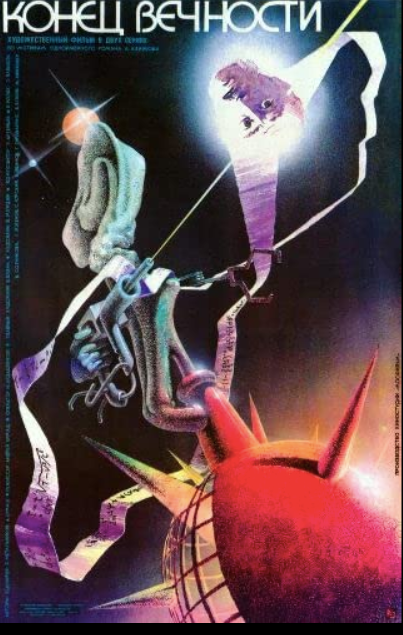
I saw a thread on Reddit about a 1987 Soviet adaptation of Isaac Asimov's The End of Eternity -- my favorite time travel novel, published in 1955 (which I first read as a kid in 1959) -- and of course I had to see it. Fortunately, it's available free, in two parts, on YouTube.
I don't speak or read Russian, but the movie has English subtitles. It's surprisingly good. When I review movie or TV series adaptations of novels and stories, I usually don't go into point by point comparisons with the source material. I try to assess the adaptations on their own terms, and stick to generalities and sprinkle in a few specifics as far as comparisons go. I'll do that here, as well as avoid specific spoilers, for those who haven't read the novel.
I say Andrei Yermash's movie is surprisingly good, because adaptations are difficult to do. The Man in the High Castle on Amazon Prime was superb, but in part because of the introduction of a new character not present in Philip K. Dick's novel, John Smith (see my conversation with Rufus Sewell, who brilliantly played the part ). There's widespread feeling that the best part of the recently concluded first season of Foundation was the clonal Cleon triumvirate, also not present in Asimov's novels and stories (see my conversation with reviewers Cora Buhlert and Joel McKinnon about this). Yermash's The End of Eternity was powerful and enjoyable and stayed pretty close to Asimov's account of a group of people, The Eternals, who use time travel to control and improve history -- according to their standards, which include stopping our movement off this planet into space -- but are challenged by one of their own who puts falling in love above all else.
Asimov's "allwhen" council of The Eternals works well in Yermash's Russian, and its evocation of the Soviet politburo. The movie also depicted my favorite gambit in the novel, communicating to the future via an ad in a news magazine. The acting was pretty good, with Oleg Vavilov as protagonist Andrew Harlan and Vera Sotnikova as his lover Noyes Lambent. And there was some nudity (I guess the Soviet Union wasn't that puritanical -- on the other hand, Konets vechnosti was made in almost the closing days of the Soviet regime.)
So my recommendation: if you like Asimov (1920-1992) -- who, after all, was born in Russia (I wonder if he knew about this movie?) -- and even more so, if you like time travel, do see this movie (again, it has English subtitles, unlike this 1976 Hungarian adaptation). It's not as good on screen as The End of Eternity is on the page, a creme de la creme of a time travel novel, the last novel that Asimov wrote, before he stopped writing science fiction novels for nearly two decades until The Gods Themselves in 1972. The End of Eternity is Asimov at his very peak as a science fiction writer, and it would be extraordinarily difficult for any movie version to equal it. But this Soviet adaptation conveys enough of the novel with style and flair to be in the upper echelon of time travel movies and well worth watching.
-------
The Loose Ends Saga -- in part inspired by Asimov's novel
'
----

No comments:
Post a Comment